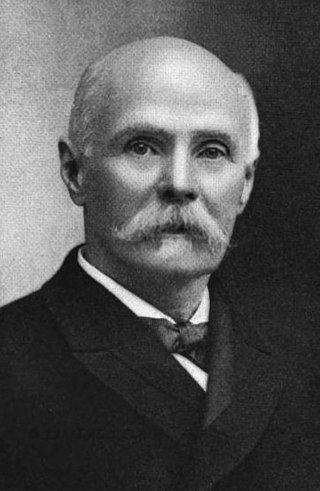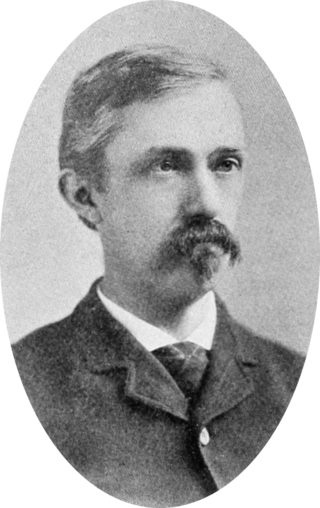
The Confederate Memorial at Indian Mound Cemetery in Romney, West Virginia, commemorates residents of Hampshire County who died during the American Civil War while fighting for the Confederate States of America. It was sponsored by the Confederate Memorial Association, which formally dedicated the monument on September 26, 1867. The town of Romney has claimed that this is the first memorial structure erected to memorialize the Confederate dead in the United States and that the town performed the nation's first public decoration of Confederate graves on June 1, 1866.

Okonoko is an unincorporated community in Hampshire County in the U.S. state of West Virginia. Okonoko is located in northern Hampshire County, along the Potomac River and the CSX Cumberland Subdivision of the former Baltimore and Ohio Railroad.

Indian Mound Cemetery is a cemetery located along the Northwestern Turnpike on a promontory of the "Yellow Banks" overlooking the South Branch Potomac River and Mill Creek Mountain in Romney, West Virginia, United States. The cemetery is centered on a Hopewellian mound, known as the Romney Indian Mound. Indian Mound Cemetery is also the site of Fort Pearsall, the Confederate Memorial, Parsons Bell Tower, and reinterments from Romney's Old Presbyterian Cemetery. The cemetery is currently owned and maintained by the Indian Mound Cemetery Association, Inc.

Robert White was an American military officer, lawyer, and politician in the U.S. state of West Virginia. White served as Attorney General of West Virginia (1877–1881) and served two terms in the West Virginia House of Delegates, representing Ohio County in 1885 and 1891.
William Armstrong was an American lawyer, civil servant, politician, and businessperson. He represented Hampshire County in the Virginia House of Delegates from 1818 to 1820, and Virginia's 16th congressional district in the United States House of Representatives from 1825 to 1833.
Romney Academy was an educational institution for higher learning in Romney, Virginia. Romney Academy was first incorporated by the Virginia General Assembly on January 11, 1814, and was active until 1846 when it was reorganized as the Romney Classical Institute. In addition to the Romney Classical Institute, Romney Academy was also a forerunner institution to Potomac Seminary. Romney Academy was one of the earliest institutions for higher learning within the present boundaries of the state of West Virginia.

Alexander W. Monroe was a prominent American lawyer, politician, and military officer in the U.S. states of Virginia and West Virginia. Monroe served as a member of the Virginia House of Delegates and West Virginia House of Delegates representing Hampshire County. He was the Speaker of the West Virginia House of Delegates during the 1875–1877 legislative session. Monroe also represented Hampshire County in the West Virginia Constitutional Convention of 1872.

Samuel Lightfoot Flournoy was an American lawyer, politician, and businessperson in the U.S. state of West Virginia. Flournoy served as a state senator representing the 12th Senatorial District in the West Virginia Senate (1885–1890) and served three terms as mayor of Romney, West Virginia. Flournoy unsuccessfully ran as a candidate for the West Virginia Democratic Party gubernatorial nomination in 1900.

John Collins Covell was a 19th-century American educator and school administrator specializing in deaf education in the U.S. states of Virginia and West Virginia.

The Virginia Argus and Hampshire Advertiser, often referred to simply as the Virginia Argus, was a weekly newspaper published between July 1850 and August 1861 in Romney, Virginia. The paper's circulation of 800 copies was the second-highest in Hampshire County, after the South Branch Intelligencer's. The Virginia Argus ceased publication following its closure by the Union Army during the American Civil War, after which it was not revived.

Henry Bell Gilkeson was an American lawyer, politician, school administrator, and banker in West Virginia.

Howard Hille Johnson was a blind American educator and writer in the states of Virginia and West Virginia. Johnson was instrumental in the establishment of the West Virginia Schools for the Deaf and Blind in 1870, after which he taught blind students at the institution's School for the Blind for 43 years.

John Baker White was a 19th-century American military officer, lawyer, court clerk, and civil servant in the U.S. state of Virginia.

Joshua Soule Zimmerman was an American lawyer, politician, and orchardist in the U.S. state of West Virginia. In the early years of the 20th century, Zimmerman served as the Prosecuting Attorney for Hampshire County and as a Democratic member of the West Virginia House of Delegates.

James Sloan Kuykendall was an American farmer, lawyer, and Democratic politician in the U.S. state of West Virginia. Kuykendall was twice elected as a member of the West Virginia House of Delegates representing Hampshire County. Kuykendall also served three terms as the mayor of Romney and later fulfilled the position of city attorney.

Christian Streit White was an American military officer, lawyer, court clerk, pisciculturist, and politician in the U.S. states of Virginia and West Virginia.
Andrew Wodrow (1752–1814) was a prominent Scottish American merchant, militia officer, clerk of court, lawyer, and landowner in the colony of Virginia.
Romney Classical Institute was a 19th-century coeducational collegiate preparatory school in Romney, Virginia, between 1846 and shortly after 1866. Romney had previously been served by Romney Academy, but by 1831 the school had outgrown its facilities. The Virginia General Assembly permitted the Romney Literary Society to raise funds for a new school through a lottery. On December 12, 1846, the assembly established the school and empowered the society with its operation.

The Romney Literary Society existed from January 30, 1819, to February 15, 1886, in Romney, West Virginia. Established as the Polemic Society of Romney, it became the first organization of its kind in the present-day state of West Virginia, and one of the first in the United States. The society was founded by nine prominent men of Romney with the objectives of advancing literature and science, purchasing and maintaining a library, and improving educational opportunities.
William C. Clayton was an American educator, lawyer, politician, and businessperson in the U.S. state of West Virginia. Clayton served in the West Virginia Senate representing the Eleventh Senatorial District of West Virginia from 1875 until 1879. He was twice principal of the Romney Classical Institute in Romney in 1853 and 1866.


















